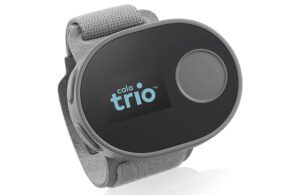
The Cala Health Cala Trio [Image courtesy of Cala Health]
The Galien Foundation last night honored Cala Health’s Cala Trio essential tremor treatment wearable as 2022’s best medical device innovation.
The foundation describes its Prix Galien awards as the global equivalent of the Nobel Prize for the life science industry.
The Cala Trio offers a non-invasive method to send signals to the brain to treat essential tremor rather than deep-brain stimulation. It was one of two dozen devices that were nominees in this year’s competition. (Here is Medical Design & Outsourcing‘s roundup of the full 24.)
More about Cala Health and its Cala Trio
MDO recently interviewed Cala Health co-founder and Chief Scientific Officer Kate Rosenbluth and CEO Renee Ryan about the creation of the technology. The Cala Trio has FDA clearance as an external upper limb tremor stimulator, available by prescription only. Worn on the wrist, it targets the thalamus. It’s the same site in the brain that deep brain stimulation (DBS) targets to control tremors.
Early on, the Cala Health team found they could put motion sensors on the wearable to detect the tremor speed. That’s because oscillations in the brain are well-correlated to the speed of hand tremors.
“It’s typically between a slow tremor of about 4 Hz and a fast tremor of about 12 Hz,” Rosenbluth told MDO. “So, we realized that onboard a single device, we could both measure the frequency or the speed of a patient’s tremor and deliver the electrical stimulation to treat the tremor. And by bringing those two areas of the individualized monitoring and calibrated stimulation into a wrist-worn form factor, we could offer patients tremor relief.”
Challenges in developing the device included figuring out the optimal timing of the stimulation needed to interrupt the tremor signal sent from the hand and wrist to the brain. That distribution indicated to the Cala Health team that the signal from the nerves that pass very close to the skin near the carpal tunnel would be able to send a signal to the same location in the brain as DBS — but non-invasively.
The company’s transcutaneous afferent patterned stimulation (TAPS) therapy sends patterned signals to the brain across the skin to stimulate the thalamus. It’s possible to individualize the treatment. Measuring the speed of each patient’s tremor, the Cala Trio can deliver a signal that alternates between the medial and radial nerves in the wrist at the same frequency as the tremor. The result is tremor relief both during and after the stimulation. Patients wear the device for 40-minute sessions throughout the day.
RELATED: How Cala Health’s wrist-worn device treats essential tremor
Last night’s Prix Galien awards also highlighted the best medical device innovation of 50 years.
In addition to the annual Prix Galien awards, the Galien Foundation announced Golden Jubilee Award winners to mark the most significant innovations of the past 50 years. In the medtech category, Abbott received a Prix Galien Golden Jubilee Award for its FreeStyle Libre continuous glucose monitor (CGM). Other medtech receiving the designation included Edwards Lifesciences’ Sapien 3 Ultra TAVR and Roche’s Cobas HPV test.
Last night’s Prix Galien’s annual awards also included Exscientia’s end-to-end AI-driven precision medicine platform as the Best Digital Health Solution. Plus, the Galien Foundation honored Quantum Surgical and its Epione interventional oncology robotics as the best medtech startup. The FDA cleared Quantum Surgical’s robot-assisted tumor ablation tech earlier this year.